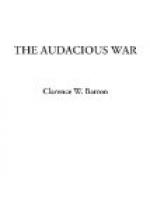Until we have practical application of a world-wide police in maintenance of the peace of nations, not alone by international agreement, which can be broken, but by agreement and international police-enforcement, so that it cannot be broken, there can be no universal peace.
We are now approaching that time.
There is no more reason why aggregations of people should have the right of murder, destruction, piracy, and pillage, than that individuals should have such right.
This is just a simple, practical question in human advancement. The world should now be big enough to grasp and effectively deal with it. The true meaning of this war is, therefore, human progress: humanity taking on larger responsibilities—the whole world answering the question, “Am I my brother’s keeper?” with a thunderous, “Aye! we are one and all our brother’s keeper, and we may well keep the peace of the world!”
There is no question, national or international, no question of the individual or collection of individuals, which cannot be settled by the laws which belong in the human heart. Such laws may be called spiritual or natural, divine or human; they are one and the same.
Moses wrote no new law on the tables of stone on Mount Sinai. The laws were before the tables of stone, and before the creation of the mountain itself. It was only for the people to hear and to do.
It is the same to-day. The laws of brotherhood—brotherhood of individuals, brotherhood of nations, or aggregations of individuals—are unchanged and unchangeable. It is only for the world to hear and to do.
The doctrine that war is a biological necessity must go by the board. The teaching that war is needed to harden men and nations must be placed in the realm of pagan fiction.
If war is a necessity for man, it is a necessity for woman. If it is good for men, it is good for children. If it is good for nations, it is good for states. If it is good for states, it is certainly good for cities. If it is good for peoples, it is good for individuals.
War is Hell, and from Hell. Hell may not be abolished, but it may be regulated.
Wars may not be abolished from the human heart, but they may be restrained from breaking forth to the destruction of the innocent and the guiltless.
There is only one practical way to do this, and that is to have nations under restraint, just as nations have states and cities under restraint. Then international courts of justice may perform the same work national courts now perform in respect to differences between states.
Man has come up from the individual, or dual, unit through family and tribal relation, the walled city, the policed state, into the armed nation. He is now steadily stepping forth into the world as ruler of himself, the creator of his own government, the heir and sovereign of the world. He can step into the kingdom of manhood suffrage or government only so far as the rights of his fellow men are recognized. Evil holds its own destruction, and nations that live by the sword perish by the sword.




